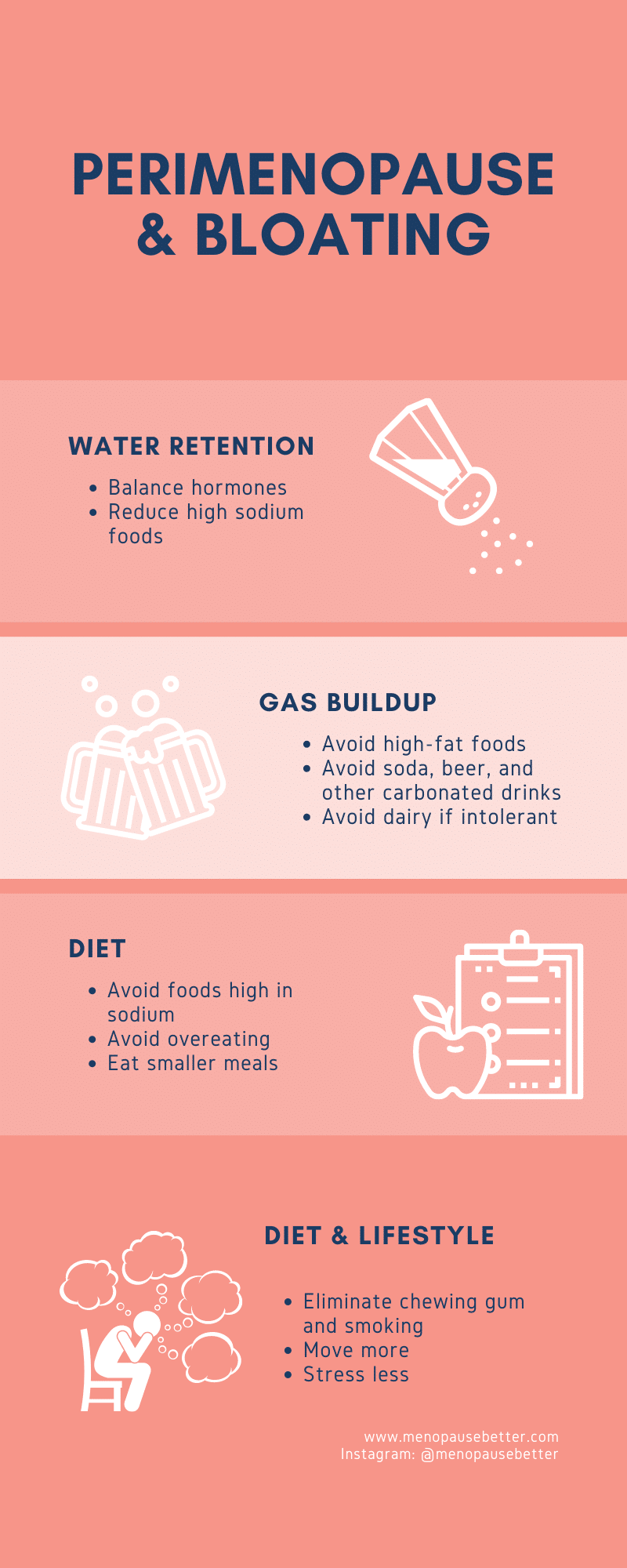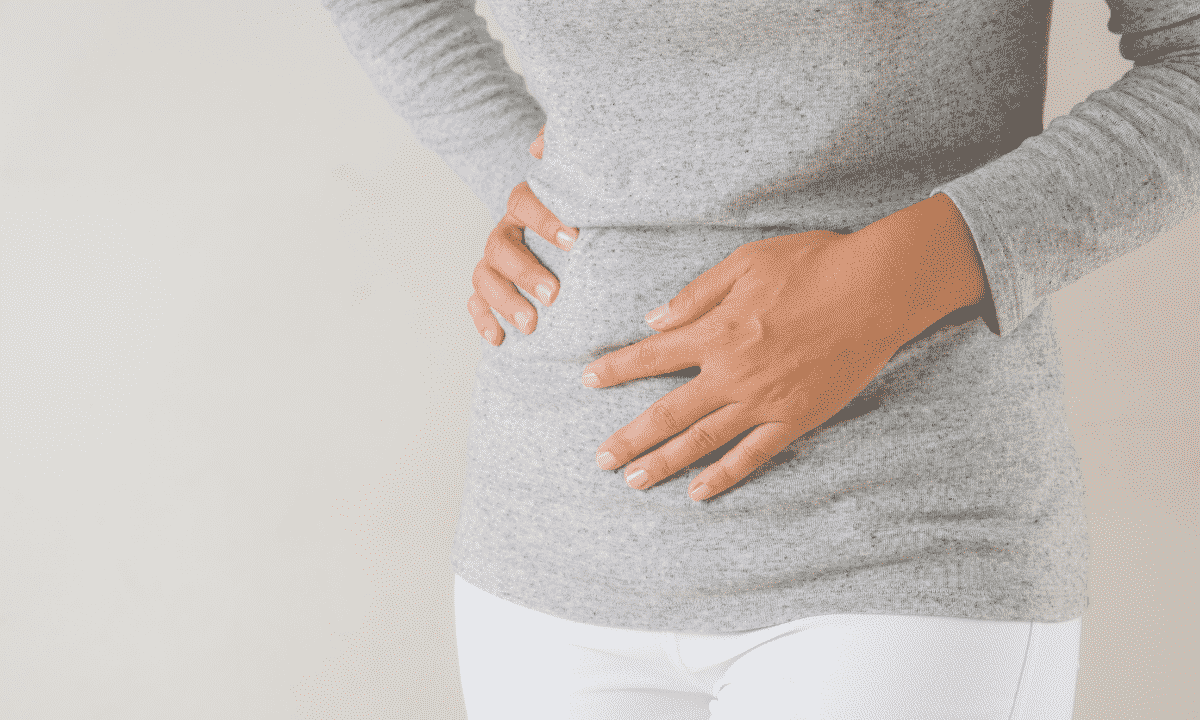Perimenopause and Bloating: Causes and Remedies
“Perimenopause and Bloating” was written by Registered Dietitian Rebeca Rashidifard. Reviewed/edited by Su-Nui Escobar, DCN, RDN, FAND.
Table of Contents
ToggleBloating is a common problem during perimenopause, and it could be caused by fluctuating hormones. However, it might also be related to other lifestyle habits that can easily be modified.
This issue can be very uncomfortable. For example, when you are bloated, you may feel full, tight, or expanded in the abdominal area. Also, your clothes will not fit well.
The good news is that bloating can be treated with lifestyle changes and medications. This blog post will discuss the causes of and remedies for bloating, weight gain, and when to talk to your doctor.
Causes
Bloating can happen because of hormone fluctuations leading to water retention and changes in the digestive system.
Water Retention
Retaining extra water can cause bloating, especially in the abdomen, legs, and arms.
Estrogen dominance plays a role in water retention. While we expect this hormone to go down during perimenopause, the reality is that it goes both up and down. This erratic pattern results in various symptoms, including water retention, hot flushes, vaginal dryness, mood swings, and weight gain. (1)
Furthermore, higher estrogen levels lead to the adrenal glands producing more aldosterone, affecting the ability of the kidneys to process water efficiently. As a result, water and salt imbalance results in fluid retention. (1)
Another hormone that decreases in perimenopause progesterone, acts as a natural diuretic ). If estrogen levels become much higher than progesterone, less water will leave the body, resulting in water retention. (1)
Other causes of water retention include excessive salt intake, standing or sitting for too long, certain medications, and certain chronic diseases.
It Might Be Constipation
Constipation during perimenopause is common and can lead to abdominal bloating. Estrogen and progesterone levels change once women enter into perimenopause. Because these hormones have an impact on gut motility and fluid balance, this can cause constipation. As a result, you will feel bloated. (2, 3)
Excess Gas Buildup
Gas is produced as a normal part of digestion, but too much gas can lead to bloating.
There are a few different reasons you might be producing too much gas, including:
- Eating more fiber than usual (this will regulate over time)
- Eating high-fat foods
- Drinking carbonated drinks like soda and beer
- Lactose found in milk and other dairy products
Other Diet and Lifestyle Causes
Bloating can occur due to nutrition and lifestyle issues that impact your digestive system, including:
- A diet that is high in fat, sugar, or sodium
- Overeating
- Lack of movement
- Stress
Gastrointestinal System
Chronic conditions in the digestive tract can also lead to bloating, including:
- Irritable bowel syndrome (IBS)
- Inflammatory bowel disease (IBD)
- Small intestinal bacterial overgrowth (SIBO)
- Lactose intolerance
- Food allergies
- Celiac disease
- Parasitic infections

Perimenopause Bloating Remedies
Diet and Lifestyle
Perimenopause and bloating can be treated by making diet and lifestyle changes, including (4, 5)
- Avoiding fatty foods, sodas, beer, and dairy
- Skipping processed foods that are high in salt and fat
- Limiting fried foods
- Avoid eating in excess
- Eating lean protein to help balance hormone levels
- Eating vegetables and whole grains to improve your digestive system
- Eliminating chewing gum, carbonated beverages, and smoking
- Drinking enough water
- Including prebiotic and probiotic foods in your diet
- Eating smaller meals
- Exercising regularly
- Moving more throughout the day
- Managing stress
Beyond helping with bloating, these recommendations are excellent for overall better health.
Medications
While medications should not substitute healthy habits, they might help to treat bloating. It’s a good idea to talk to your health care provider before taking any medication.
Medications to alleviate bloating include:
- Anti-bloating medication
- Water-reduction pills – also known as diuretics, are only available by a prescription from your doctor and will relieve fluid retention in the body
- Birth control pills to help stabilize hormones
- Menopausal hormone therapy (6, 7)
If you’re suffering from your symptoms, it’s important to address the health of your whole body through food and lifestyle. Try using a journal to keep track of what triggers your bloating.
Also, it’s important to look at possible digestive and thyroid issues and nutrient deficiencies.
Is it Bloat or Weight Gain?

Knowing the difference between bloating or weight gain is essential to managing the causes. If you are bloated, you will see a change in your abdomen around the time of your period or after eating. In addition, you will only notice an expansion around your belly, arms, and legs.
If you’re experiencing weight gain, your stomach won’t change in size throughout the day, but you will notice a consistent change in the size of your belly and other areas that store fat, such as the backs of your arms or your thighs.
Weight gain is also a symptom of perimenopause, and weight loss after 40 takes a different approach. However, it always starts by eating a diet of vegetables, fruits, whole grains, lean proteins, and healthy fats while getting enough sleep and movement. (8, 9)
When to See a Doctor
Knowing if your symptoms are from perimenopause or a different condition can be difficult. Your doctor can provide a diagnosis and help improve your symptoms by learning about your problems, history, age, and through a physical exam. Your doctor might also perform a blood test to check your hormone levels.
If you make food and lifestyle changes and don’t see a decrease in bloating within a few weeks, it might be a sign of a more serious issue, so you should always refer to a health care professional. If perimenopausal bloating is impacting your life, your doctor can prescribe over-the-counter or prescription medications. (10, 11)
Overview
Perimenopausal bloating is common. Bloating occurs due to hormonal fluctuations, changes in digestive health and in your diet and lifestyle.
It’s comforting to know that are many ways to alleviate bloating in perimenopause., and a lot is under your control.

Dr. Su-Nui Escobar, a Registered Dietitian/Nutritionist in Miami, FL, is dedicated to empowering women in perimenopause and menopause to live healthier, more satisfying lives.
With a doctorate in clinical nutrition from the University of North Florida, she has expertise in menopause and weight loss, including the unique challenges faced by those on weight loss medications.
Su-Nui’s passion for her field is evident in her previous role as the Academy of Nutrition and Dietetics spokesperson.


